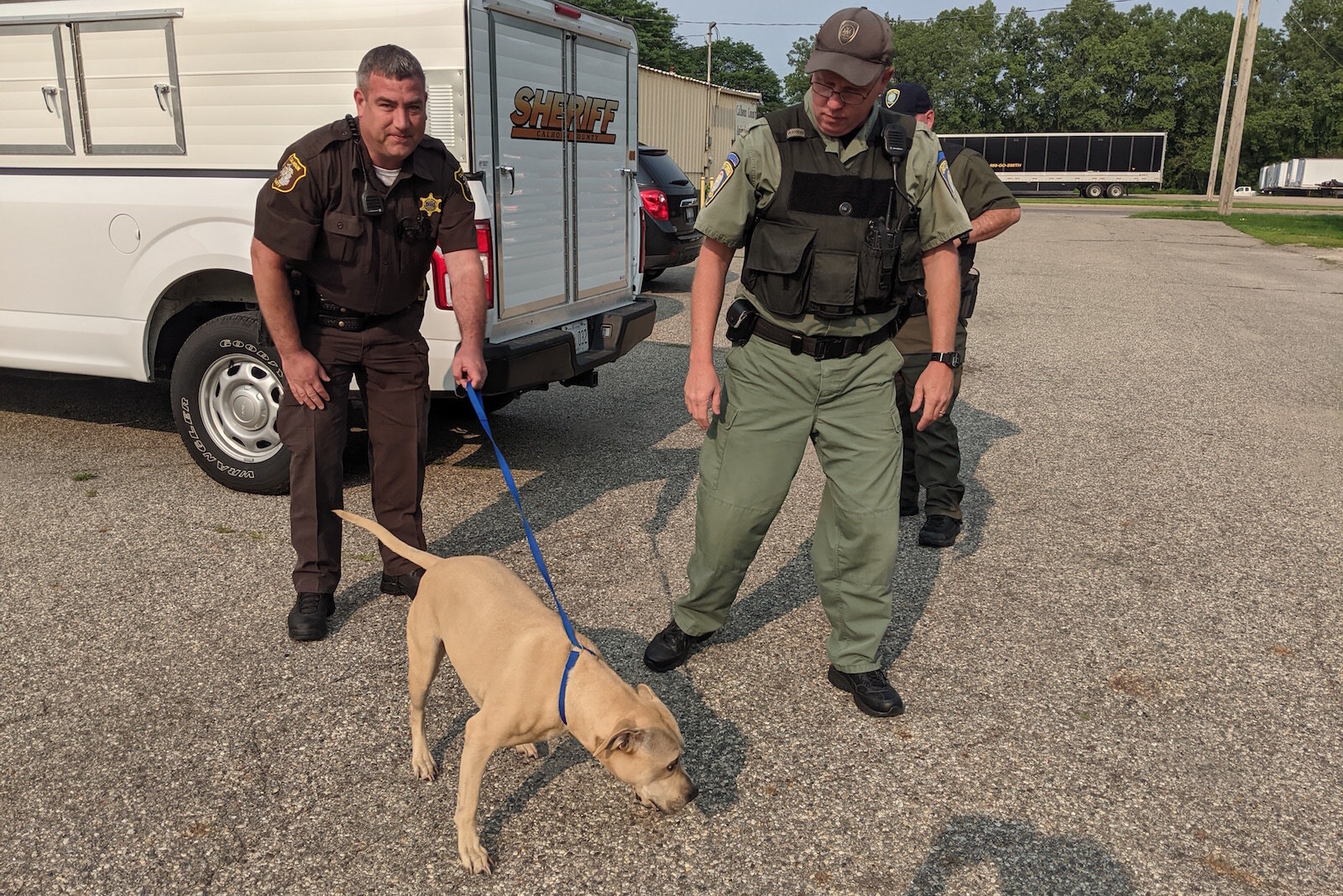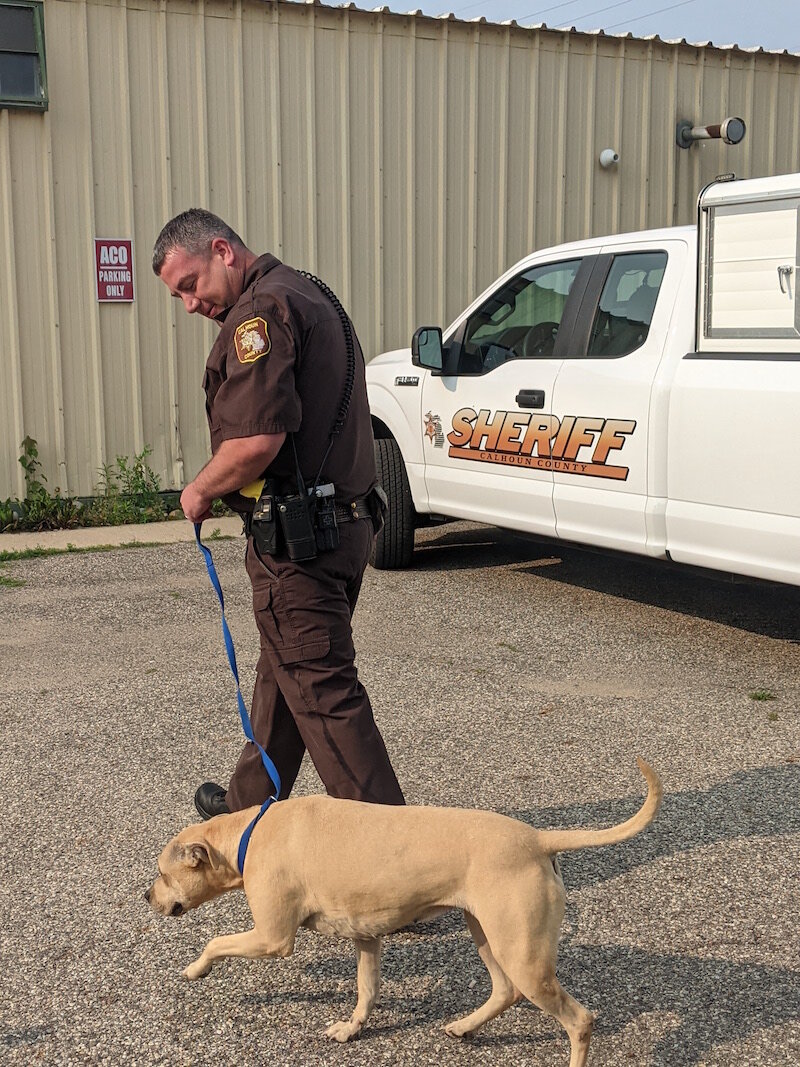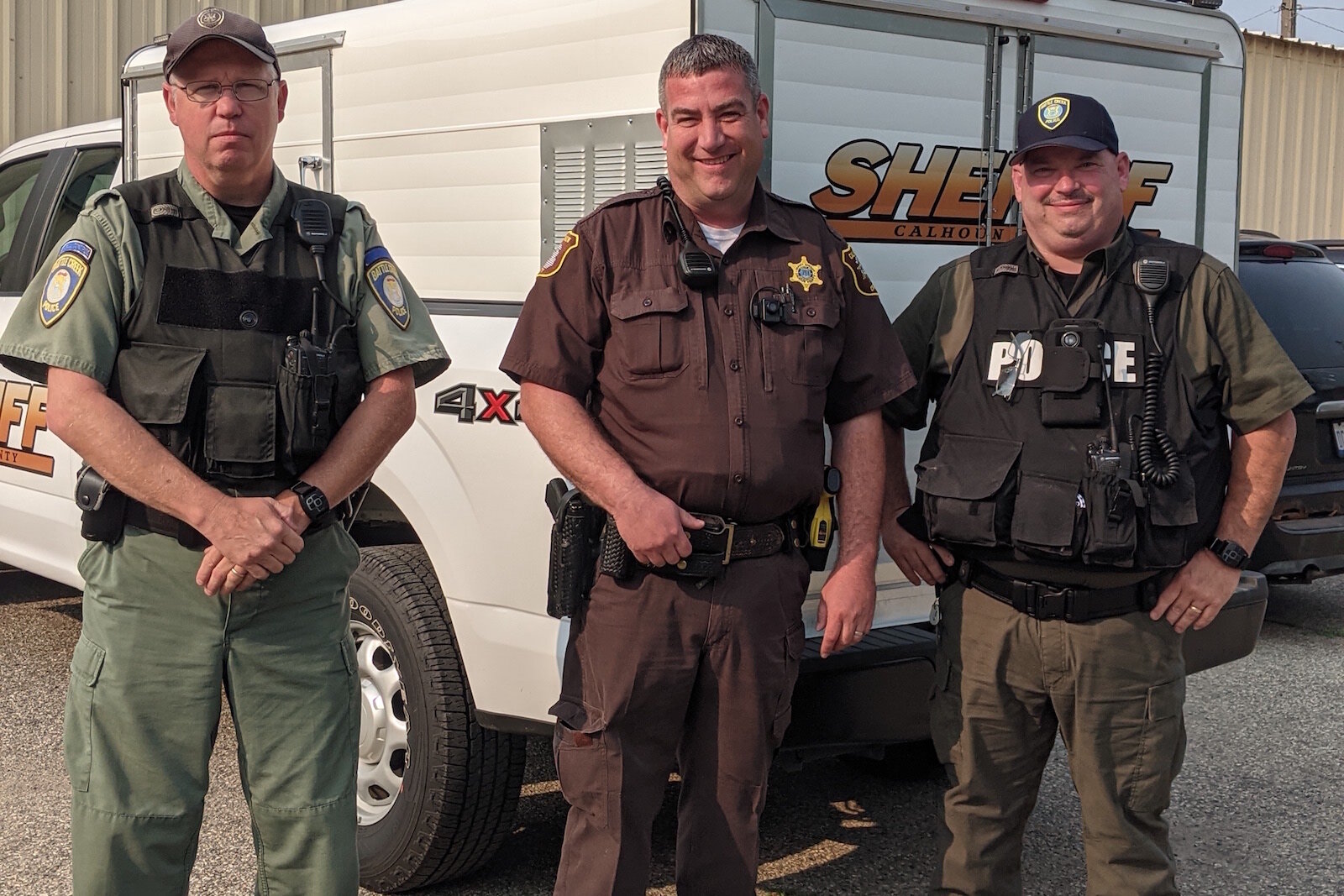Editor's note: This story is part of Southwest Michigan Second Wave's On the Ground Battle Creek series.
In any given year, Calhoun County and the City of Battle Creek collectively respond to more than 3,000 calls for service and transport of more than 1,000 dogs and 2,000 cats to the Union Street shelter where the animals can be reunited with their owners or adopted out.
The number of unlicensed and stray dogs in Calhoun County and the City of Battle Creek is an issue especially during the summer months when dogs and people are more likely to be spending more time outdoors, say animal control officers.
“A lot of people are out and they see more stuff like a dog that they want to be checked on. I do a lot of animal welfare checks and cruelty calls,” says Calhoun County Sheriff’s Deputy Michael Vanderbilt, the county’s only designated Animal Control Officer.
On any given day he may be handling between five to 10 calls for service involving animals. He also makes traffic stops and handles other calls for service that the Sheriff’s Department routinely handles such as vandalism or domestic disturbance calls.
 Deputy Michael Vanderbilt holds a dog that will be going back into the shelter as Officer Michael Ehart looks on.“I can work anything from animal control to working the road,” says Vanderbilt, a 17-year veteran with the department.
Deputy Michael Vanderbilt holds a dog that will be going back into the shelter as Officer Michael Ehart looks on.“I can work anything from animal control to working the road,” says Vanderbilt, a 17-year veteran with the department.
For every 50 dogs that are the focus of a call for service, he says on average about two of those dogs have licenses.
“It’s very rare that I go on a call where the owner has a license for that dog and they most likely never had one,” he says.
The same is true for his counterparts assigned to the city of Battle Creek’s Animal Control Unit which is part of the Battle Creek Police Department. Officer Michael Ehart has been working the Animal Control beat for 27 years and says that he thinks people who own dogs and cats don’t understand the licensing process.
Between 10 and 15 percent of the calls for service he receives involve educating pet owners.
“A lot of times people think the tags they get at a (veterinarians) office for rabies are licenses and they’re not,” Ehart says. “For me, these calls are about true education because they just don’t know the laws or understand or realize that they’re in violation.”
The number of dogs that Vanderbilt sees on animal control calls is two to three times the number of licenses sold through the county.
From January to June of this year the county sold an average of 189 dog licenses each month, says Penny Miller, Calhoun County’s Foreclosure Prevention Manager. She says these fees bring in about $4,919 each month. The city issued 436 licenses between Jan. 1 and May 31.
 Deputy Michael Vanderbilt walks a dog back into a shelter that houses stray dogs and cats who are picked up by city and county Animal Control officials.Miller says the sale of dog licenses is not a moneymaker for the sheriff’s department or the county, but the sheriff’s department is required under a state statute to sell the licenses.
Deputy Michael Vanderbilt walks a dog back into a shelter that houses stray dogs and cats who are picked up by city and county Animal Control officials.Miller says the sale of dog licenses is not a moneymaker for the sheriff’s department or the county, but the sheriff’s department is required under a state statute to sell the licenses.
“I know it’s a problem for the sheriff’s department getting dogs licensed,” Miller says. “I don’t know how many dogs aren’t licensed. I would like to see more dogs licensed.”
Depending on the situation, an owner with an unlicensed dog could be issued a citation that will cost them $100. They have a 14-day window to either pay the fine or pay for a license. Vanderbilt says the majority of people will come up with the money to purchase a license and that ticket is no longer an issue. For those that don’t get a license or pay the fine, an arrest warrant is issued.
“The next time we deal with them, we could arrest them and they could go to jail for that dog license violation,” Vanderbilt says. “It’s basically a fix-it ticket, but it turns into a $100 fine if they do nothing.”
Incentivizing licensing
While some owners may be unaware of the need for a license for their canine companions, there are others who may not have the money to cover the annual cost.
The cost of a dog license through the county is $13.50 per year for a spayed or neutered dog. The city charges $5 for its one-year licenses for both cats and dogs and that cost increases to $20 through the city and $27 through the county if the animals are not sterilized.
Licenses also are sold at local veterinary offices and municipalities and they keep $3 for each license sold, says Melinda Weaver, Deputy Treasurer for Calhoun County.
In an effort to increase the number of dogs licensed, the County Treasurer’s Office will be offering licenses at half-off of the regular price on Aug. 21 from 10 a.m. to 1 p.m. at the Home Run Dog Park at 800 E. Roosevelt Ave.
 From left, Officer Michael Ehart, Deputy Michael Vanderbilt, and Officer Pat Dellinger.“It’s an ongoing struggle,” Weaver says of making sure more pets are licensed.
From left, Officer Michael Ehart, Deputy Michael Vanderbilt, and Officer Pat Dellinger.“It’s an ongoing struggle,” Weaver says of making sure more pets are licensed.
The fees from the sale of these licenses are used to cover costs, specifically a privately operated animal shelter at 165 S. Union St. in Battle Creek that houses dogs and cats picked up by Ehart and Vanderbilt. The city and county contract with that shelter to care for the animals picked up by their animal control employees.
The annual budget for the city’s Animal Control division is $500,000. The Sheriff’s Department does not have a specific budget for its animal control services because Vanderbilt handles routine calls for service as well as those focused on animals.
“With an animal control call, the location could be anywhere from 45 to 90 minutes away from where I may be at the time,” Vanderbilt says. “Revenues have gone down so much that I’m the only one handling these calls now.”
Ehart is part of a two-person Animal Control division with the recent hire of Officer Pat Dellinger.
While the city requires licenses for cats, the county does not because “the state of Michigan has classified cats as free-roaming animals and lets individual municipalities create their own ordinances to address that. I don’t know how many counties have it,” Vanderbilt says.
Ehart says he does handle his fair share of noise violations involving cats, but the majority of his calls revolve around dogs.
Keeping the peace
In recent years, Ehart says, upwards of 40 percent of these calls involve a neighbor who may have issues with another neighbor and will file a complaint based on that neighbor’s dog appearing to be loose and wandering around, barking, or relieving themselves in the caller’s yard.
“You have that one person who lives in town and he or she wants their world to be perfect and in their mind when they see someone walking their dog and he or she sees that dog peeing on their lawn, they’ll make a complaint about that,” Ehart says. “But, there are some people who are just super-scared of animals and are afraid that they’re vicious or are going to eat them.”
He says he also is seeing a trend in calls for service that are based on socioeconomics, particularly where a low-income area buts up against a high-income area.
“The biggest conflict I see is more socioeconomic. Higher-income folks don’t want a dog destroying their lawn or chewing on their fence. They don’t want to see dogs running loose and they don’t know their neighbors, so they call us,” Ehart says. “Then there are certain neighborhoods in Battle Creek where people don’t call the police for anything and if they see a dog running loose, they don’t call us.”
Vanderbilt says he doesn’t get these types of calls “because people who move out to the country don’t think there are laws like this out there and if there are, they’re not enforced. If their dog gets loose, they will tell me that they usually let him/her out and he stays in the yard. They also say that they didn’t know they needed a dog license.”
“Actual calls for service, legitimately are for dogs running loose or cats or that they need us to check on the welfare of an animal because it’s being neglected,” Ehart says.
Calls for service typically spike in May and again in October, prime mating seasons for stray cats and dogs, he says.
“Summer is always busy because animals spend more time outside,” Ehart says. “There was a June several years ago when I had 400 calls in 30 days.”
Vanderbilt says he does not anticipate a decrease in these anticipates calls because there are individuals who will continue to disregard issues such as proper licensing of their pets and making sure they are not loose and roaming.
“The biggest thing is to be responsible,” Ehart says. “As a pet owner, you’ve got to think of pets as your children because they rely on you for everything.”
"control" - Google News
July 23, 2021 at 01:13AM
https://ift.tt/3y1EdNl
Is your dog licensed? Calhoun County and City animal control officers educate dog owners on the need - Concentrate
"control" - Google News
https://ift.tt/3bY2j0m
https://ift.tt/2KQD83I
Bagikan Berita Ini














0 Response to "Is your dog licensed? Calhoun County and City animal control officers educate dog owners on the need - Concentrate"
Post a Comment